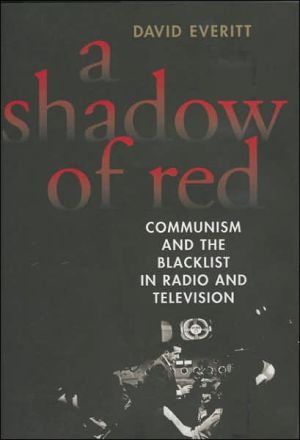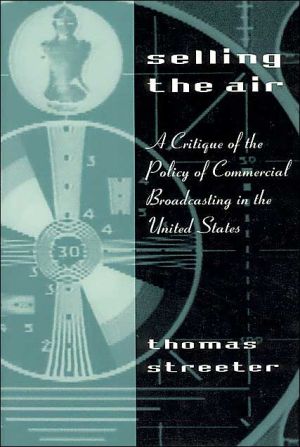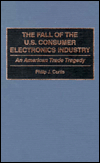Shadow of Red: Communism and the Blacklist in Radio and Television
The Cold War came to broadcasting in 1950. In that year, just as the Korean War was about to erupt, there appeared from a small publisher a booklet called Red Channels, which listed 151 suspected Communist sympathizers in broadcasting. Within months the blacklist in radio and TV began. The purge of the airwaves, distinct from the better-known blacklist in the movie industry, provoked one of the American media's great free-speech controversies. It affected scores of writers, directors, and...
Search in google:
The Cold War came to broadcasting in 1950. In that year, just as the Korean War was about to erupt, there appeared from a small publisher a booklet called Red Channels, which listed 151 suspected Communist sympathizers in broadcasting. Within months the blacklist in radio and TV began. The purge of the airwaves, distinct from the better-known blacklist in the movie industry, provoked one of the American media's great free-speech controversies. It affected scores of writers, directors, and actors, yet it was instigated by only a handful of anti-Red watchdogs-three ex-FBI agents, a former naval intelligence officer, and a grocer from Syracuse. A Shadow of Red follows the efforts of these five guardians of the broadcast media in a revealing history of the period, based on interviews, personal correspondence, FBI reports, and court transcripts. QUOTE: Ron Radosh - The New York Sun Readable and superbly researched.
\ Midwest Book ReviewA 'must' for any collection strong in media history or Cold War politics, especially at the college level.\ \ \ \ \ New York SunReadable and superbly researched.\ \ \ The Weekly StandardGenerally excellent.\ \ \ \ \ Marcus LetterAn extraordinary chronicle of the blacklist era. . . . A beautifully written and moving narrative. This is a landmark work.\ \ \ \ \ Communication Booknotes QuarterlyThe best modern study of the phenomenon, far enough removed from the people and events of six and more decades ago to provide some analytic judgment.\ \ \ \ \ Stanley I. KutlerEveritt has given us a thoughtful, considered look at the issue of Communism in American life . . . with fresh, illuminating insights.\ \ \ \ \ John Earl HaynesA complex story of clashing perspectives and personalities that will provoke thoughtful reconsideration of the balance between free speech, protest, and boycott.\ \ \ \ \ Athan TheoharisAbsorbing history. David Everitt's well-written account offers special insights into the protagonists whose actions shaped this sordid era.\ \ \ \ \ Sunday TimesA refreshingly objective study. . . . A highly readable chronicle of a tumultuous period during which the cause of anticommunism suffered from mistakes that clever enemies were quick to exploit.\ \ \ \ \ ForwardThe first book to deal evenhandedly with the origins and effects of the communist blacklist in American radio and television.\ \ \ \ \ Blue Ridge Business JournalLayered and nuanced story . . . especially pertinent at a time when many of us are terrified of our own justice department again.\ \ \ \ \ Columbia Journalism ReviewSerious in intention and illuminating.\ \ \ \ \ Midwest Book ReviewA 'must' for any collection strong in media history or Cold War politics, especially at the college level.\ \ \ \ \ The New York SunReadable and superbly researched.\ —QUOTE: Ron Radosh\ \ \ \ \ Publishers WeeklyOn June 27, 1962, former grocer Laurence Johnson was found dead in a cheap motel just outside New York City. His mysterious death would have been unremarkable had Johnson not been the driving force behind the rabid hunt for Communists that gripped the radio and TV industry from the late 1940s through the 1950s. In freelance writer Everitt's deeply researched, highly detailed account of this sordid episode in American history, Johnson was the leader of a cabal of committed anticommunists who sought to eliminate what they saw as undue influence by Communists or Soviet sympathizers in the New York–based broadcast media. In 1947, with Johnson's support, a trio of FBI agents published "Red Channels," a newsletter devoted to exposing what they saw as growing Communist influence in radio and later television. The newsletter evolved into a de facto blacklist—an ad hoc compendium of writers, producers and performers who due to their association, real or imagined, with left-wing causes were effectively barred from work. Everitt's narrow focus, however, makes this more for the history buff or red scare aficionado than the general reader. (Apr.)\ Copyright 2007 Reed Business Information\ \ \ \ \ Southern California QuarterlyDavid Everitt has produced a deeply researched and intellectually honest account of the anticommunist crusade in the radio and television industries that will (or at least should) render much of the previous mythology untenable. ... A Shadow of Red is highly recommended.\ —Thomas W. Devine\ \







